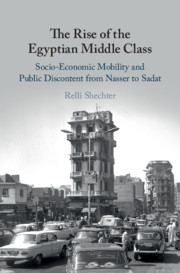 The Rise of the Egyptian Middle Class
The Rise of the Egyptian Middle Class Book contents
- The Rise of the Egyptian Middle Class
- The Rise of the Egyptian Middle Class
- Copyright page
- Dedication
- Contents
- Figures and Tables
- Acknowledgments
- Note on Transliteration
- 1 Introduction
- 2 Working into the Middle Class
- 3 “Crisis of Supply in Every Household”
- 4 “Provocative Consumption”
- 5 “Parasites”
- 6 The Resurgence of Middle-Class Islam
- 7 Conclusion: Socio-Economic Mobility and Discontent
- Works Cited
- Index
2 - Working into the Middle Class
Published online by Cambridge University Press: 24 December 2018
- The Rise of the Egyptian Middle Class
- The Rise of the Egyptian Middle Class
- Copyright page
- Dedication
- Contents
- Figures and Tables
- Acknowledgments
- Note on Transliteration
- 1 Introduction
- 2 Working into the Middle Class
- 3 “Crisis of Supply in Every Household”
- 4 “Provocative Consumption”
- 5 “Parasites”
- 6 The Resurgence of Middle-Class Islam
- 7 Conclusion: Socio-Economic Mobility and Discontent
- Works Cited
- Index
Summary
- Type
- Chapter
- Information
- The Rise of the Egyptian Middle ClassSocio-economic Mobility and Public Discontent from Nasser to Sadat, pp. 36 - 81Publisher: Cambridge University PressPrint publication year: 2018


